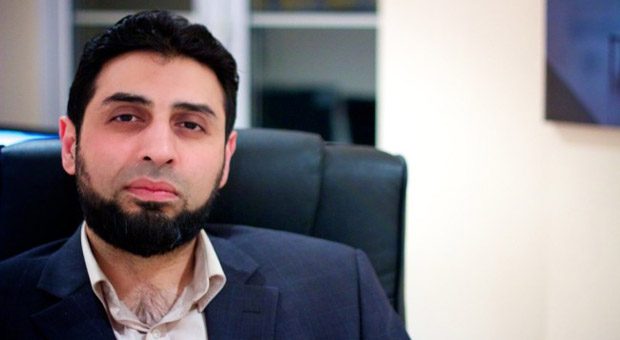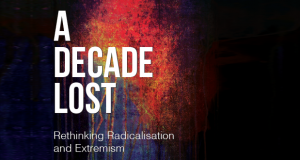In the aftermath of the events in Paris, with perpetrators still on the run, the West’s press and politicians have set a narrative across the world – that the journalists at Charlie Hebdo were killed as part of a war on free speech and as such they died as martyrs.
We could go around in circles with arguments and counter arguments. ‘Had there been no provocation there would have been no backlash’ versus ‘violence is never justified when insulted’.
One thing is for sure, in my view. Had any government in the Muslim world taken a robust stand on the on-going insults to the Prophet – peace be upon him – threatening diplomatic action or to cut trade relations over the insulting depictions – I do not believe individuals would feel the frustration to retaliate. This is one of the reasons why calls for the restoration of a legitimate Islamic polity in the Muslim world continue to resonate so strongly amongst Muslims globally – to return stability and independence to the region.
Reactions to Charlie Hebdo
The Charlie Hebdo shootings have provoked a storm of sensationalist reactions from opportunists across the spectrum. At Islam21c we have been working hard to sift through the rhetoric and find reasoned analysis from all quarters – links are available below to read. Don’t forget to like, comment and share! To keep up with the latest articles on Islam21c.com subscribe to our mailing list here
We also direct your attention to the seminal report written by Prof. Arun Kundnani since empirically-refuted connections are being made left, right and centre, between these shootings and the shooters’ incidental ideology – read the ground-breaking report that shows that Extremism does NOT cause terrorism: A Decade Lost; Rethinking Radicalisation and Extremism
Also read:
- Freedom of speech is an ideological construct by Afia Ahmed Chaudhry
- Freedom of Speech in France: For the Powerful, By the Powerful, With the Powerful by Hassan Colone
- We are not Charlie Sadia Habib by Islam21c
- My first response to the Paris incident Sh Haitham Al Haddad by Islam21c
- France Attack – the response [Video] by Dr Salman Butt
- Charlie Hebdo Shootings – Censored Video by Storm Clouds Gathering
- The moral hysteria of Je sues charlie by Prof Brian Klug
- This map shows every attack on French Muslims since Charlie Hebdo by Tell MAMA
- Paris attack designed to shore up France’s vassal status by Dr Paul Craig Roberts
- Charlie Hebdo and the Profiteers of Tragedy by AntiWar.com
Visit our dedicated page to #CharlieHebdo with all our hand-picked content here
But those who blame Islam for these killings say that like all religions it needs critiquing.
In that case, let me offer a critique of the modern secular ‘religion’ of liberalism – but with less crudeness and fewer insults than normally accompanies many ‘critiques’ of Islam.
France’s claim that free expression is a ‘fundamental principle’ of the Republic is a myth. For in France free expression is for some but not for others. Women are fined for wearing niqab – or banned from education for wearing hijab. Even at Charlie Hebdo, upheld as a bastion of free speech, this ‘fundamental principle’ was set aside to appease domestic political sensitivities when they sacked their own cartoonist Maurice Sinet for refusing to apologise for his biting item about Nicholas Sarkozy’s son, which appeared to denigrate him for marrying Jewish heiresses for money.
Similarly, when the French Prime Minister previously stated that the cartoons published by the magazine in 2011 were “expressed within the confines of the law and under the control of the courts”, he ought to have been reminded that the French senate passed a bill around the same time outlawing the denial of any genocide recognised by French law – restricting expression under the law and through the courts for political reasons.
”Free speech” is never absolutely “free”. No society has ever said there is an absolute right to say what you want. Laws outlawing speech are all around us. The British government is in the process of introducing legislation that will criminalise everyone from toddlers to parents for saying things that aren’t “British”. It has already criminalised people for insulting British troops. Germany criminalises holocaust denial, despite it remaining legal elsewhere. There are many examples across Europe – and usually applied selectively.
Every society has restricted speech according to their belief and value system. In secular Western society religion is largely unvalued so blasphemy is permitted. Whereas in many other parts of the world, including the Islamic world, religion is a central value and so blasphemy becomes a redline issue, including insulting any of the Prophets of God, starting from the Prophet Adam, to Prophets Moses and Jesus to the Prophet Mohammad (salallahu alaihi wasallam – and Peace be on all of them).
The existence of redlines in different societies should not imply the closure of debate. Certainly not in the case of Islam, which has a centuries-old Islamic tradition to engage in debate, tolerate criticism and hear the critiques of others. But criticism and debate is different to deliberately targeting the insult to others.
The cost to societal harmony from the ‘freedom to insult’ is rarely discussed. This freedom to mock and deride, born out of Europe’s particular dilemma of Church authority, opened the door to the growing disrespect and anti-social behaviour in society – where rudeness is celebrated as a sign of assertiveness, courtesy undervalued as weakness, and all too many people do not respect each other or the law.
Where such “freedoms” were once used to account those in power and prevent the excesses of the state, they are now directed at a community that holds no such status. The freedom to insult the sacred symbols of Islam has become a tool to bully and persecute a minority community – with a rise in the far right and anti-Muslim sentiment.
In this context an ultimatum has been served to Muslims – that it is not enough to say that the capital punishment for insulting the Prophet of Islam should be done after due judicial process by an Islamic authority – and not by ‘lone rangers’. That it is not enough to say that Muslim in a non-Muslim country under a covenant should not be a vigilante, killing people in broad daylight, some of whom had nothing to do with insulting the Prophet.
Rather, what is expected of a Muslim in Europe today is that you bow down before the god of free speech until you accept that every Prophet can be insulted – and you learn to like it or laugh it off!
That is an unacceptable expectation by those who attack Islam. Muslims living in the West have only one option when faced with insults against their beloved Prophet – and that is to speak out. Those who work to remove even that option will fail. They will find we continue to speak out loudly– despite the mockery and hatred.
Those who say we must all be allowed to insult each other freely should realise the resulting society is one where people start to hate each other, even when they tolerate each other. By contrast a society that considers deliberate insult and unnecessary provocation of others something to be avoided, is one where people will live harmoniously despite their varied differences.
The current pattern of state policies, community alienation, provocation and retaliation only fuels fear, intimidation and mistrust – for Muslim and non-Muslim alike. What is needed is more mature debate and intellectual discussion rather than insults, lies and false narratives. And despite the ultimatums put to us, Muslim remain ready for this.
[donationbanner]
Orignally posted on Hizb.org.uk here












Why can’t people except each other rather then saying there religious belief is better then others. Man kind is very primitive as it encourages people to not question but just except a belief system in order to control. It’s sadly based on fear, that when we die we go to heaven or hell. Society is at a lower spectrum in spiritual grow, it will only change for the better once people except that we all will die and this is normal process and importantly except that were always be different from each other.